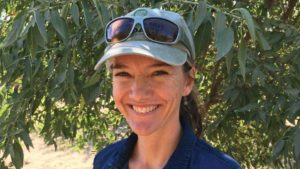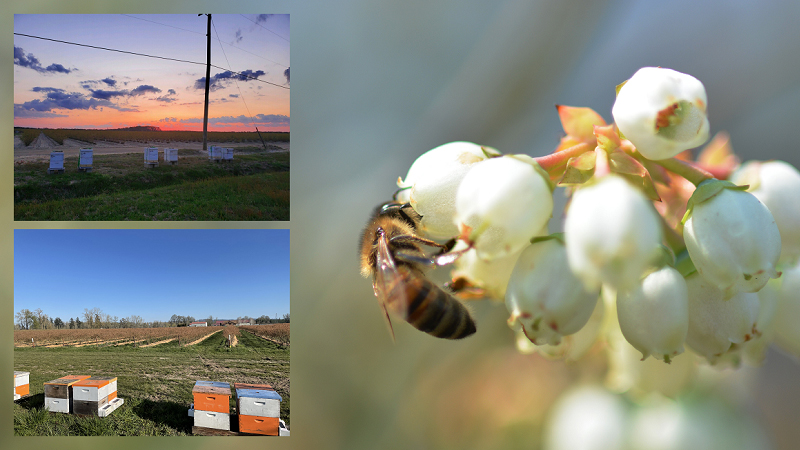Meet Newest University Of California Nut Crops Advisor
The newest University of California Cooperative Extension nut crop advisor, Mae Culumber, is based in Fresno County. Culumber has a PhD in soil science and a master’s in ecology from Utah State University. Western Fruit Grower® magazine recently caught up with her to ask her a few questions to help introduce her to the state’s nut industry. You can contact her at [email protected].
 Q: What interests you about farming in general and nut growing in particular? Why?
Q: What interests you about farming in general and nut growing in particular? Why?
A: I have always been interested in the simple notion that farmers feed people. I enjoy being outdoors and working with the soil, which I think are critical prerequisites for taking an interest in farming! Nuts crops are complex perennial systems that pose different challenges than what is found in annual field crops. I am excited about engaging in studies that investigate the relationships between the many factors that ultimately determine yield and nut quality throughout the life of an orchard. Plus, nut orchards supply a lot of shade to work under!
Q: How familiar are you with California? With the San Joaquin Valley? What drew you to the area?
A: Aside from a few visits to various parts of the state, I was not all that familiar with California or the San Joaquin Valley until moving here earlier this summer. I have always wanted to work in Extension, an occupation that allows you to work directly with growers and implement research that has direct applications to improve production practices. The San Joaquin Valley is the epicenter of agricultural production, and the University of California is a national leader in Cooperative Extension efforts. So, in a sense, all roads in orchard system outreach and Extension lead here.
Q: Are you very familiar with the industry?
A: Before beginning this position, I was not very familiar. I am getting good exposure to all aspects of production, through interactions with growers, pest control advisors (PCAs), and field represetatives on farm visits, as well as nursery and processing facility tours. I have gained an understanding of the industry’s explosive growth in recent years and that the perpetuity of nut crops as our highest valued agricultural crop hinges on the stability of global markets, the expansion of domestic markets, and availability of the resources needed to maintain optimal production.
Q: Have you set any short-term goals as of yet? Any long-term goals?
A: My short short-term goals include getting to know as many growers as I can to learn about the diversity of issues impeding production in the region. I hope to develop a program that effectively conveys how to adopt tried and tested best management practices. In the long term, I would like to find ways to address the more difficult issues through the design and implementation of collaborative research efforts.
Q: Your doctoral research at Utah State University focused on sustainable orchard systems. How can focusing on sustainability improve a grower’s bottom line?
A: Maintaining the bottom line is a critical component of a sustainable orchard production. A grower’s operation can be more sustainable by adopting practices that increase soil organic matter and develop soil structure. These attributes promote better infiltration and aeration, support microbial populations that cycle and retain nutrients, and enhance the soil’s resiliency to pest and disease infestation. These improvements have the potential to reduce the frequency of necessary fertilizer, pesticide, and herbicide applications. However, a lot of work needs to be done to understand how we can do this in our region, as our arid climate is generally less conducive to accumulations of soil organic matter. Additionally, production standards dictate maintaining a clean orchard floor during the growing season and mitigating accumulated salts with leaching in the off season, which limits the time interval we can consider incorporating soil-building cover crops into orchard floor management.
Q: As you know, after years of unparalleled success, nut growers have seen some headwinds in recent times. What can you bring to the table to help growers succeed?
A: Growers know best how to ride out uncertain times because that is the nature of their business. My role is to communicate the science indicating which production practices have the greatest potential to assist them in enduring challenges imposed by changing political, economic, and environmental conditions.
Q: If we have another year of drought, some growers are going to have to take extreme measures. How can you help them?
A: Tools have been developed to help growers know the optimum time and duration to irrigate based on evapotranspiration models, tree water stress, and soil moisture. Many of these tested tools are underutilized although feasible to integrate into farm management. Increased implementation of these technologies can be achieved by better training and communication about the tangible water savings associated with their use.
Q: If you could have dinner with one well-known person who is either alive today or from the pages of history, who would it be? Why?
A: The actor Daniel Day Lewis has always fascinated me. He is a method actor, meaning he remains in character for the complete duration of film production. Being a method actor, with several roles in historical eras, I would guess he has a developed sense of what is was like to live during those times. The outstanding historical drama “There Will Be Blood” was set during the Southern California Oil boom of the late 19th and early 20th century, a time that shares commonalities with this century’s struggle with the scarcity and increasing value of water resources.









